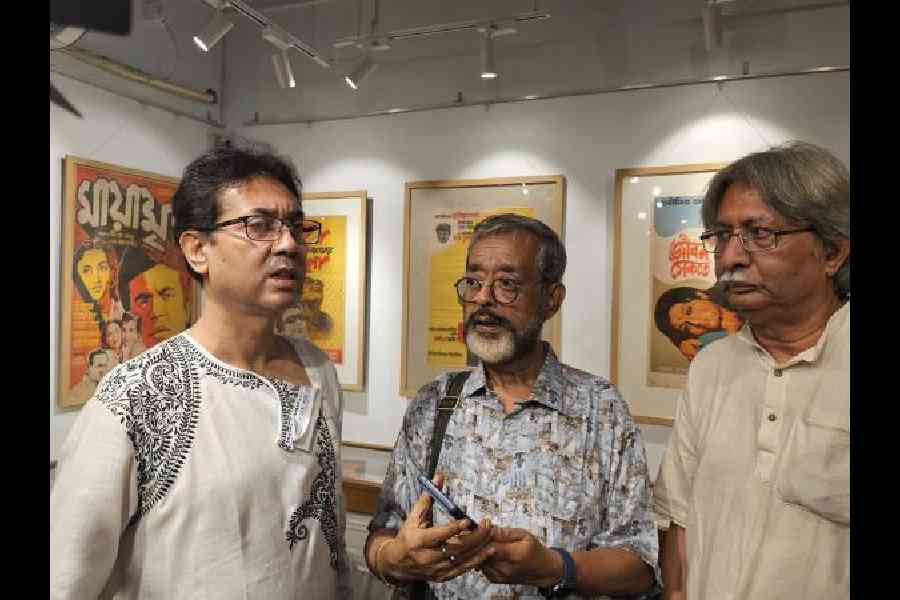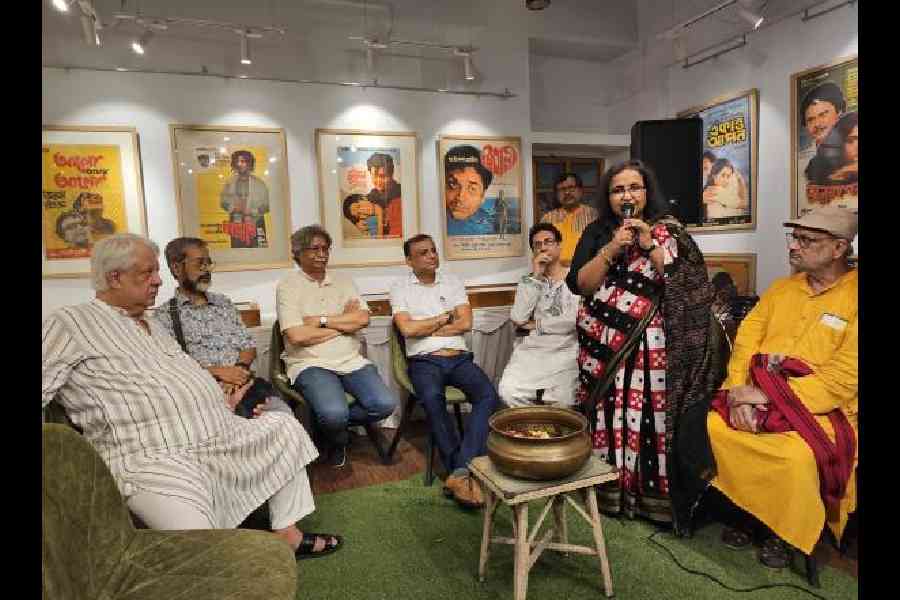In 1990, Saikat Mitra was supposed to record a song for Salil Chowdhury. So busy was the composer then that he would keep sending the young singer back. Finally he composed the tune and wrote the first couple of stanzas, promising to write the rest soon.
“The day of recording arrived and we were at the HMV studio. When I halted after the first antara, he asked why I had stopped. I did not have the guts to tell him that he had not written the lyrics yet. He asked me to search, and so I did dutifully, till he asked: ‘Ami likhini, na re?’”
Speaking at an adda to mark the launch of a poster and disc exhibition ahead of World Music Day to pay tribute to composers whose works have added sheen to the golden era of Bengali songs, Mitra recalled with awe how Chowdhury glanced at the first two stanzas and asked for a pen. “It was just the time needed to put pen to paper and scribble the words that he needed to complete the song. And this is what he wrote:
Hajaro bochhorer bnachar sukhe bhora jeebone koto pol paar holam,
Sei hishab jodi dhoro toh koti koti bochhor prithibir buke chhilam;
Kintu mone jani je kawti pol tumi amar buke dhora dile shey koti pol sudhu bnechechhilam.”
The conversation was taking place among the offsprings of doyens of Bengali music such as Sudhin Dasgupta, Nachiketa Ghosh and Shyamal Mitra, who were joined by singer and archivist Devajit Bandyopadhyay and researcher Debasis Mukhopadhyay. Jhinuk Gupta, Pankaj Kumar Mullick’s granddaughter-in-law, also dropped by for a while.

Generation Next: Saikat Mitra, Suparnokanti Ghosh and Soumya Dasgupta, sons of Shyamal Mitra, Naciketa Ghosh and Sudhin Dasgupta respectively Picture by Sudeshna Banerjee
Suparnokanti, Nachiketa Ghosh’s son, shared memories of staying in a house in Mumbai from where S.D. Burman’s house could be seen. “Often, he would be pacing in the verandah wearing nothing but a gamchha.”
Basu Chatterjee, who wanted to sign him for a film, visited the building on several occasions, only to be turned away by the doorman. The temperamental Burman was then reluctant to take on a new project.
“Finally Chatterjee got Manna Dey, who had started in Bombay as SD’s assistant, to help him get an appointment. Burman asked Chatterjee if he knew his fee. SD had stuck to Rs 1 lakh, even at a time when his son RD was charging Rs 7 lakh, simply because he did not believe in taking more. As instructed, the next morning Chatterjee reached with a new attaché case filled with cash. Burman asked him to open it and commented that he would accept only fresh notes,” said Suparnokanti. It could not be known whether Chatterjee obliged or Burman relented but the film did happen — Us Paar (1974).
Saikat recalled the respect that senior artistes commanded. “Baba (Shyamal Mitra) was to do the music for Ananda Ashram, which would be a remake of the 1941 film Daktar (starring Pankaj Mullick). He went over to Pankaj Mullick’s house with me to seek his permission.”
Good music could come only from good relationships, felt Suparnokanti. “Sandhya pishi (Mukherjee) would invariably call me in the morning if we had an evening sitting to ask what I would eat as she knew I would be coming from office.”
His father (Nachiketa Ghosh, the composer of evergreen hits like Neeshi raat banka chand, Neer chhoto kshoti nei and Surjo dobar pala) was a good singer. “He would often do shows with Dwijen kaka (Mukhopadhyay). Once he was singing in presence of Mullick. He forgot the tune of a Tagore song midway and managed by improvising. When he got off stage, Mullick made him promise never to perform Rabindrasangeet again,” laughed Suparnokanti.
Another composer, Sudhin Dasgupta, Saikat said, had got Bengali music to graduate “from half pant to full pant”. “Despite being trained in the West, he infused a Bengali vibe in his tunes that resonated with the youth,” he said.
Sudhin’s guitarist son Soumya, who had lent his art space Wisdom Tree for the exhibition, recalled being berated by Manna Dey for attending a jamming session. “He would switch to English at times. ‘Young man, what are you doing here?’ he asked me. When I said I was playing, he retorted: ‘Porashona ki gollay gyachhe?’ On hearing I was a student of architecture, he was a bit pacified and said: ‘OK. But you should not be here too often.’”
Saikat also spoke of the frustrations of icons in later life. “Once when I was at RD’s flat in Bombay, he asked me what I was seeing through the window. When I responded ‘the road’, he said once the road could not be seen due to the queue of visitors and their cars. Even Salil jethu had such dark thoughts. Once he asked me to massage his forehead one night in Delhi. As I did, tears trickled down his face. ‘Bengalis have not understood me. They will do so 50 years after I go,’ he reflected.”
While the exhibition saluted composers, Suparnokanti requested for similar tributes for lyricists as well. “People remember only the singers, not the creators of the songs,” said the man who has given music to songs like Coffee House-er shei adda ta and Shey amar chhoto bon.











